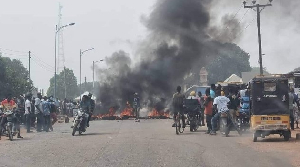The Africa Institute on Governance and Security (AIGS) has condemned the resurgence of the conflict in Bawku, calling on the government to address the matter swiftly.
The conflict, which has claimed lives, destroyed properties and continues to pose great risks to the livelihoods of the people, has become a matter of urgency and national security.
The group said the escalating crisis in the Upper East Region requires urgent attention and the need for a comprehensive and inclusive approach to resolve it.
The recent violence claimed eight lives in October 2024 due to the long-standing ethno-political dispute between the Kusasi and Mamprusi communities.
In a press release made available to GhanaWeb, the group said, “In this pluralised ethnocentric political landscape, we call upon the youth of Bawku to exercise maximum restraint and refrain from actions that could further inflame tensions.
“The youth are the future of our nation, and their energy must be channeled toward building peace, not perpetuating conflict. We urge them to resist being exploited by divisive forces and instead become ambassadors of reconciliation and unity in their communities,” parts of the statement read.
The AIGS also urged the government to take immediate and decisive steps to restore peace and strengthen security in the Bawku region.
They listed their recommendations as follows:1. Enhancing Security Measures: Deploy adequate security forces to maintain law and order, protect lives, and prevent further violence, while ensuring that these forces operate with professionalism and respect for human rights.
2. Supporting Mediation Efforts: Provide full logistical and political support to the ongoing mediation process led by His Royal Majesty, Otumfuo Osei Tutu II, the Asantehene, which is set to resume next week. The government must work closely with traditional leaders, civil society, and all stakeholders to ensure the success of this initiative.
3. Addressing Root Causes: Invest in long-term solutions by addressing the underlying issues of chieftaincy disputes, land ownership, and economic marginalization in the region. This includes promoting inclusive dialogue and equitable development to reduce ethnic tensions.
4. Economic Empowerment for Youth: Implement programs to support the youth of Bawku, whose livelihoods — such as commercial motorcycle operations — have been severely impacted by curfews and insecurity. Economic opportunities can deter youth involvement in violence and foster stability.
AIGS further said it is prudent to address the issue swiftly since this is not merely a regional issue but a national security concern with the potential to destabilise Ghana and the broader West African subregion, especially given its proximity to conflict zones in Burkina Faso.
The AIGS commended the efforts of traditional leaders, particularly Otumfuo Osei Tutu II, for mediating in the crisis, an act that has shown promise in resolving similar conflicts, such as the Dagbon crisis.
They also acknowledged President John Mahama’s commitment to supporting the process, even though they insist that more needs to be done to ensure that peace is not only restored but also sustained.
“We call on all Ghanaians — across ethnic, political, and regional lines — to stand together in solidarity for peace. The Africa Institute on Governance and Security remains committed to supporting initiatives that promote good governance, security, and inclusive development across the continent.
“Let us work collectively to ensure that Bawku, and indeed all of Ghana, remains a place of harmony and progress for all its citizens,” they concluded.
SSD/AE
Watch the latest edition of BizTech below:



